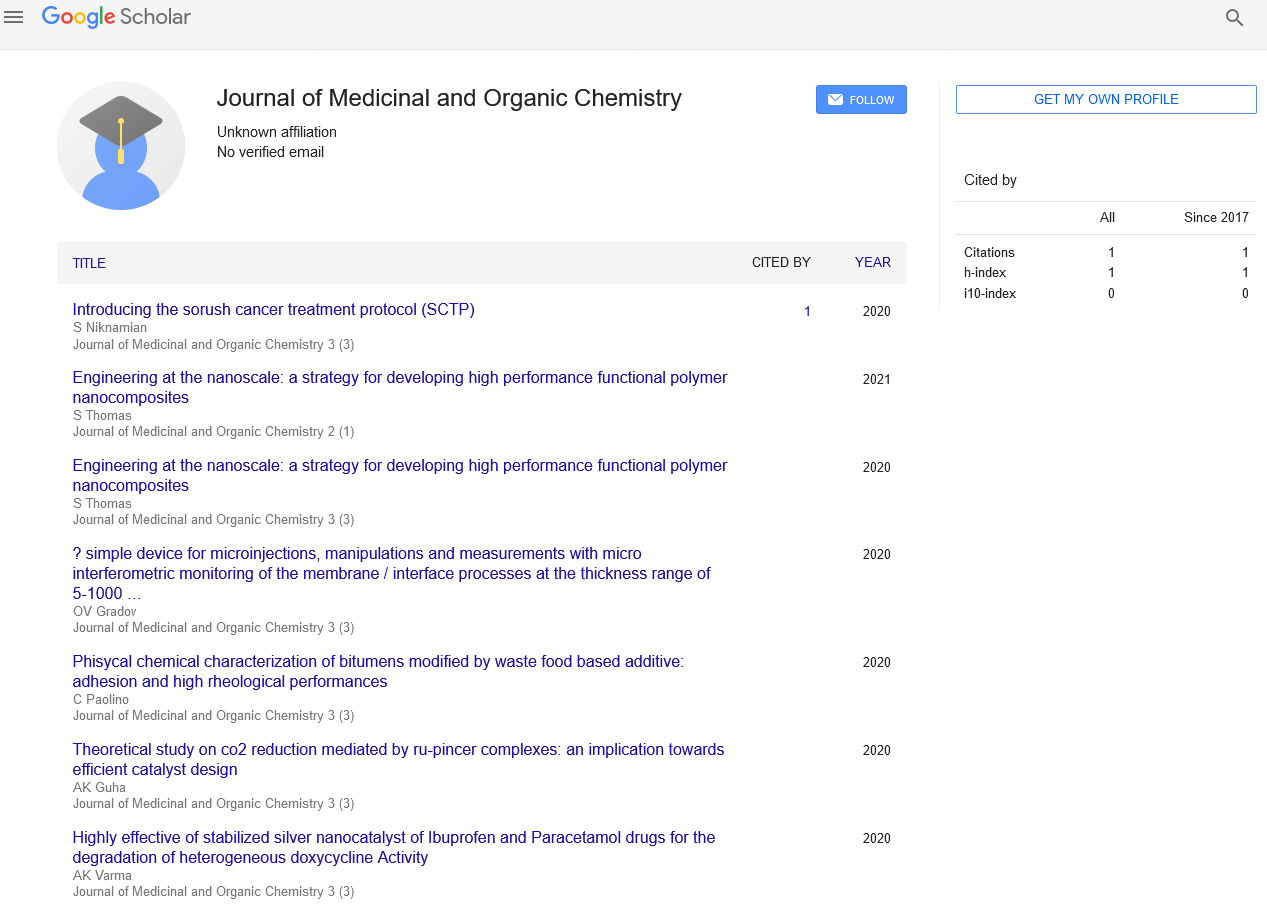Perspective - Journal of Medicinal and Organic Chemistry (2024) Volume 7, Issue 5
Organic Nutrition: A Comprehensive Guide to Health and Wellness
- Corresponding Author:
- Eva Ardanaz
Department of Nutrition,
University of Conrdiya,
Montreal,
Canada
E-mail: ardanaz.aicua@nav.es
Received: 03-Jul-2024, Manuscript No. JMOC-24-140606; Editor assigned: 08-Jul-2024, PreQC No. JMOC-24-140606 (PQ); Reviewed: 22-Jul-2024, QC No. JMOC-24-140606; Revised: 01- Oct-2024, Manuscript No. JMOC-24-140606 (R); Published: 29-Oct-2024, DOI: 10.37532/jmoc.2024.7(5).255-256
Introduction
Immunology, the sIn recent years, organic nutrition has surged in popularity as more individuals become conscious of their health, the environment and the quality of their food. This movement towards organic eating is not merely a trend but a significant shift towards a lifestyle that emphasizes natural and sustainable food sources. This article explores the fundamentals of organic nutrition, its benefits, the differences between organic and conventional foods and practical tips for incorporating organic choices into daily life.
Description
Organic nutrition
Organic nutrition refers to a dietary practice that prioritizes the consumption of foods produced through organic farming methods. These methods exclude the use of synthetic pesticides, fertilizers, Genetically Modified Organisms (GMOs) and other artificial additives. Instead, organic farming relies on natural processes, such as crop rotation, composting and biological pest control, to maintain soil health and promote ecological balance.
Organic foods are typically labeled with certifications that ensure they meet specific standards set by regulatory bodies. In the United States, for example, the USDA Organic seal indicates that a product has been produced following the guidelines established by the National Organic Program (NOP).
Benefits of organic nutrition
Fewer pesticides and chemicals: One of the primary health benefits of organic food is the reduced exposure to harmful pesticides and chemicals. Conventional farming often uses synthetic chemicals to protect crops from pests and diseases, but these substances can leave residues on food. Over time, consuming these residues can lead to health issues, including hormonal imbalances and an increased risk of certain cancers. Organic foods, by contrast, are grown without synthetic pesticides, reducing the risk of these health problems.
Nutrient-rich: Studies suggest that organic foods can be more nutrient-dense than their conventionally grown counterparts. For example, organic fruits and vegetables often contain higher levels of vitamins, minerals and antioxidants. These nutrients are essential for maintaining overall health, boosting the immune system and reducing the risk of chronic diseases.
No GMOs: Organic foods are free from genetically modified organisms. GMOs are created through genetic engineering, a process that alters the DNA of plants or animals to achieve desired traits, such as pest resistance or faster growth. The long-term health effects of consuming GMOs are still not fully understood, prompting many people to choose organic to avoid potential risks.
Environmental Benefits
Sustainable farming practices: Organic farming methods prioritize sustainability and environmental health. By avoiding synthetic chemicals and promoting biodiversity, organic farms help maintain healthy soil, conserve water and reduce pollution.
These practices contribute to a more sustainable food system and help mitigate the impact of climate change.
Biodiversity: Organic farms often cultivate a variety of crops and use natural pest control methods, which promote biodiversity. This diversity is crucial for maintaining healthy ecosystems and preventing the spread of pests and diseases.
Animal welfare
Organic livestock farming adheres to strict animal welfare standards. Animals raised on organic farms are given organic feed, access to the outdoors and are not treated with antibiotics or synthetic hormones. These practices ensure that animals are raised in more humane and natural conditions.
Practical tips for incorporating organic foods into your diet
Start small: Transitioning to an organic diet doesn’t have to happen overnight. Begin by incorporating a few organic items into your shopping list, such as organic apples, spinach or dairy products. Gradually increase the number of organic foods you buy as you become more comfortable with the change.
Prioritize certain foods: If budget constraints make it difficult to buy all organic foods, prioritize purchasing organic versions of the “Dirty Dozen.” This list, compiled by the Environmental Working Group (EWG), highlights fruits and vegetables with the highest levels of pesticide residues. Common items on this list include strawberries, spinach and apples.
Shop locally: Buying organic foods from local farmers’ markets or CSA programs can be more affordable than purchasing them from grocery stores. Additionally, local produce is often fresher and more sustainable.
Grow your own: If you have space, consider growing your own organic fruits, vegetables and herbs. Gardening can be a rewarding hobby and allows you to control what goes into your food.
Read labels: When shopping for organic foods, look for labels that indicate the product is certified organic. In the U.S., the USDA Organic seal is a reliable indicator of organic certification. Be cautious of terms like “natural” or “all-natural,” as they are not regulated and do not necessarily mean the product is organic.
Plan meals: Planning meals and creating a shopping list can help you stick to your budget and make healthier food choices. Incorporate a variety of organic foods to ensure a balanced and nutritious diet.
Educate yourself: Stay informed about organic nutrition and farming practices. Understanding the benefits and challenges of organic food can help you make more informed choices and advocate for a healthier food system.
Conclusion
Organic nutrition offers numerous benefits for health, the environment and animal welfare. By choosing organic foods, consumers can reduce their exposure to harmful chemicals, support sustainable farming practices and enjoy potentially more nutrient-dense and bettertasting foods. While the cost of organic foods can be a barrier for some, there are practical ways to incorporate organic choices into your diet without breaking the bank. By starting small, prioritizing certain foods and shopping locally, anyone can begin to reap the benefits of organic nutrition.

